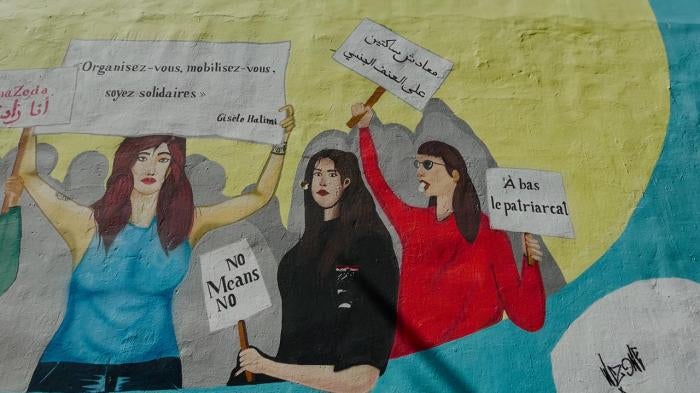Tunisia: Domestic Violence Laws Need Support
Read a text description of this video
Actor’s Voice
“Ahlem”, Domestic violence survivor:
I went to the police and told them, “He threw me out of my house. I am on the street.” They said there was nothing they could do for me. “ That is his home, he is free [to do what he wants.]”
Ahlem”, a pseudonym, is scared of being punished by her husband for speaking out and does not want to be identified.
Zeineb Mecheregue, President, ADDCI, NGO supporting survivors: [Domestic] violence exists but it is denied. “So what. He’s your husband, the owner of your house.” So what if he beats you? It’s no big deal.”
Narration: In 2017, the Tunisian Parliament adopted Law 58, which set out measures to prevent violence against women, protect survivors, and prosecute abusers.
Translation of sign: “Don’t stay silent. Law 58 protects you.”
Narration: Unfortunately, the law has not been widely implemented by many among the police, prosecutors, courts or medical providers. For example, police often require a recent medical certificate to show a woman has been abused before they will investigate or provide protection to her.
“Ahlem”, Domestic violence survivor
"I went to the police station. I told them what happened. They told me your medical certificate is older than a week or two so there is nothing we can do for you.
Narration: Many women have nowhere to turn as there are few domestic violence shetlers in Tunisia and little to no financial support for women experiencing abuse.
Arbia Alahmar, Social Worker, National Union for Tunisian Women (UNFT), Tunis: For a woman who doesn’t work and is financially tied to her husband, making a complaint, going through trial, reaching out to specialized police units on violence against women all that requires …..means! Sometimes, women who come to us have to borrow money to pay for the taxi ride.
Soumaya Razgallah, She is the Goal – NGO:
In association meetings, that raise awareness about patriarchy, women get angry! They say] “Leave us alone, what is this talk you’re giving us?” They completely rejected it. “Right,are you going to support me when my husband beats me and throws me out of the house? If I speak to him that way and he throws me out of my house and my family doesn’t take me in, are you going to help me nd they are right! Because their families are not going to take them in with their bags and kids
Narration: It’s not enough to pass a law. The Tunisian government should provide resources, including shelters and financial assistance to survivors, in support of Law 58. They should also ensure that all authorities are fully implementing the law so women really are protected from domestic violence
In 2017, the government of Tunisia passed Law 58, a progressive law to protect women from domestic violence. Five years later, Human Rights Watch interviewed over 100 individuals including 30 survivors of violence against women, police officers, judges, lawyers, staff of nongovernmental organizations, and other individuals providing services to survivors. Our research found that five years after the adoption of the law, state officials, including police officers, judges and lawyers who are supposed to be at the forefront of the law's implementation, still harbored dismissive attitudes toward survivors. Too often, survivors are discouraged from going further with their complaints. There are also not enough support services to help women escape domestic violence.
